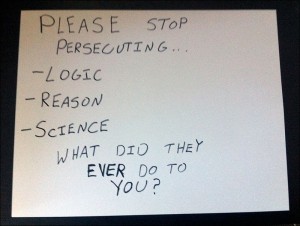Review: The Secret

Don’t be alarmed. I read this so you don’t have to.
I know what you’re thinking. Which book isn’t like the others? And so it would seem a preface is very much in order.
It all started with a lighthearted conversation with a family friend that morphed spontaneously into a much deeper and more philosophically tinted exchange, touching upon everything from karma to palmistry (palm-reading) and eventually to something called ‘the secret’. Now, I believe it my rational duty to adopt a posture of skepticism when anyone claims to have the secret to success and the workings of the universe, especially when said person is not a scientist and has no formal scientific training.
I had heard only vague murmurings about Rhonda Byrne’s 2006 book (and film of the same name) prior to this conversation and knew only of its fashionable reputation in the self-help genre. Previous associations notwithstanding, when her “Law of Attraction” was verbalized over the course of this conversation, all of my antennae were telling me to doubt, doubt, doubt. But in a gesture of acte gratuit I accepted the invitation to read the book that had just been placed in my hands.
When I brought it home, I quite honestly did not intend to read it. There are just too many other books peering out from my shelf and vying for attention. But curiosity won out and I found myself leafing through it a little every day. Oy vey. For someone allegiant to the scientific method, slogging through The Secret is what I imagine Ayn Rand must have felt like reading the New Testament gospels. I now understand why the self-help market is such a target of high dudgeon. With insufferable twaddle like this clogging the shelves, is it worth our time sifting through the dunghills to see if any gems might be buried there? Not sure I wish to find out.
Page after page I encountered something guaranteed to set off alarm bells in the skeptic’s acropolis. Between the abortive attempts at profundity and middle-school metaphysics, a central message began to emerge. It is this: that one’s thoughts directly affect one’s success (or lack thereof) in life. See for yourself:
—–
—–
If you’re still with me, that means you haven’t croaked from exasperation. Were I able to scribble in the margins I’d have copy-pasted the below meme ad infinitum.
See I have a fundamental problem with every single one of the messages above: they are a castle of lies based on no evidence at all. Thoughts are not “magnetic”; they don’t “move into physical reality”; the “law of attraction” is not a “law of nature”; our thoughts do not “invite illness”; laughter does not “lead to miraculous cures”; people are not kept in poverty because of “their lack of gratitude”; and thoughts by themselves cannot “cause you to put on weight” because our thoughts are not “the primary cause of everything.” (Tell that last one to the Jews. Better yet, don’t.)
A reasonable question at this juncture might be to inquire of Byrne’s background. I am actually unable to find any record of her educational history or, indeed, whether she even attended college. It is as though the internet has been suspiciously scrubbed of anything prior to her jaunts with Australian television. Regardless, the preceding excerpts practically drip of science illiteracy. I knew I was in for some unsolicited arrhythmia when I read the following just minutes after picking it up: “Quantum physicists tell us that the entire Universe emerged from thought” (p. 15). No, they don’t — they really don’t. Whether she has a formal education or not, it is clearly not in STEM (as if titles like The Magic and The Power didn’t tip you off already).
Take a look once more at her first quote above, if you dare. To speak about phenomena that “literally moves into physical reality” is to speak about scientific phenomena. Byrne’s “Law of Attraction,” carried to its logical conclusion, is the idea that thoughts bend nature to their will — that renovating one’s inner state of mind feeds into tangible effects outside of that mind. In case it needed spelling out, there is no known physical mechanism by which this can occur. This is rubbish mixed with high-octane nonsense. Are we to suppose Byrne has stumbled onto something hitherto uncharted by the communities of academics who have made careers out of studying nature? Her infirm speculations do not belong in an analogy with the law of gravity any more than screen doors belong in submarines.
And so here I am, forced to parade a criticism I’ve leveled at no other book to date. As emotionally appealing though they may be, there is not a shred of support for any of the grandiose claims in The Secret. As I wrote in my review of Carl Sagan’s penultimate tome, science relies on the principles of skepticism and trained observation fueled by an overarching preference for the truth, however inconvenient, over the psychologically comfortable. These may indeed be comforting, compelling messages Byrne is putting out there. But the more we want something to be true the greater skepticism we should wield in its vicinity.
Mentality and Meditation
So what can be said about the ground Byrne covers in The Secret? As psychologist Christopher Chabris notes in his dual review in the NY Times, the “Law of Attraction” isn’t novel. Some pre-Socratics meddled in it, it’s what some medieval natural philosophers thought, and indeed, Byrne cites several of these figures in between her scattered logical dead ends. But that was then and this is now. We’ve learned much since Plato.
We wouldn’t, by analogy, adopt a particular view of cosmology because elements of it are found in Giordano Bruno’s musings on nature. In science, the litmus test is evidence, not ancient writings or naked intuition. Chabris also has some juicy bits about the web of ways our mind can deceive us into ascertaining nonexistent patterns, e.g. “illusory correlation” and the related phenomenon of “playing up the hits and downplaying the misses,” all of which trespass directly on Byrne’s magical mind slaughter.
Byrne cites early on the inspiration for her movement: a 100 year-old book called The Science of Getting Rich. “Wealth attraction,” as the author called it, was bunk then and it’s bunk now. Byrne has simply repackaged this and other superstitious fluff for the modern uncritical listener. But why entertain the fact-free notion of metaphysical causal arrows between happy thoughts and the universe when the empirical literature is brimming with data of great import for the self-help audience?
Cultivating a positive inner state can bring about very real psychological benefits, from helping you cope with difficult situations to helping you interact effectively in social environments. Byrne is also in favor of meditation. Here, too, the benefits are studied and can be palpable. Introspection in its various forms has proved effective at achieving a desired conscious state. These experiences are well-established and we’ve been doing it for thousands of years since the earliest Eastern contemplatives. No additional “laws of nature” required. No voodoo woo woo.
The Dangers of Self-Help “Wisdom”
It is hardly a “secret” that positive thinking can reap appreciable benefit to one’s psychological well-being. But extrapolating from here by telling people that those thoughts animate and somehow reach out into the world like magic tendrils and cause physical transformation is entirely another matter. I’m all for positive thinking as a means for improving one’s outlook. But I’m also for communicating accurate science rather than distorting it to prey on the needs of the under-equipped.
And this is why I think books like The Secret signal a broader cause for concern. Tied up in these messages is essentially an “easy” button to life, the idea that if we only adopt a new mindset the ship will right itself. After all, Byrne’s ‘law’ is cast as a law of nature, and laws are nothing if not invariant. I have no doubt that these messages do prevent actual, necessary, useful action from being taken. When you are resigned to the idea that your thoughts enact change all by themselves, where is the incentive to take real action, to expend the effort necessary to achieve the things you — and society writ large — need or desire?
Victims of depression and the suicidal and clinically mentally unstable need professional attention, not self-help half-truths coated in meaningless, contextless jargon. No licensed clinician would advocate what Byrne advocates in this book. Someone overweight or obese may require a nutritional change to their diet or may benefit from medical prescription. What a doctor would absolutely not do is tell the patient they are obese because their thoughts are not in the right place.
Likewise, having a less poverty-stricken vision of reality will not return prosperity, happiness and riches to you as if the universe were some conscious gumball machine and obliging the downtrodden its dutiful occupation. So unless we’re willing to say that rich white people have been in on the “secret” to the exclusion of the rest of the planet, the universe doesn’t give you what you want. No amount of positive thinking can pick up the slack between coincidence and hard work.
Closing Thoughts
The oft-quoted maxim by Carl Sagan continues to hold sway: “Extraordinary claims require extraordinary evidence.” These are certainly some extraordinary claims being sent out by Ms. Byrne, but the only effects they are having in the real world are on her bank account. Other than false hope and dreamed-up physics, there are no secrets to be found in Byrne’s self-help manifesto.
Make no mistake: this is pure, distilled pseudoscience concentrate at its most disingenuous, a manufactured word tangle that is the intellectual equivalent of canned Spam and a Jason Statham flick. She works in equivocal quotes from past intellectuals, many of whom would no doubt call high treason on their conscription here, and dresses up her conjectural detritus in sciencey-sounding language ripped straight from a Deepak Chopra meditation tape. As it turns out, weight management, food security, and global conflict and disease do not all and sundry yield before Byrne’s transfinite law. Millionaires are not in tune with the universe. Negative thoughts don’t land you in the unemployment line. And honesty has always been better medicine than bullshit.
Note: This review is mirrored over at Goodreads and at Amazon.
Feature image: The Solutionist by Nobod3




Comments